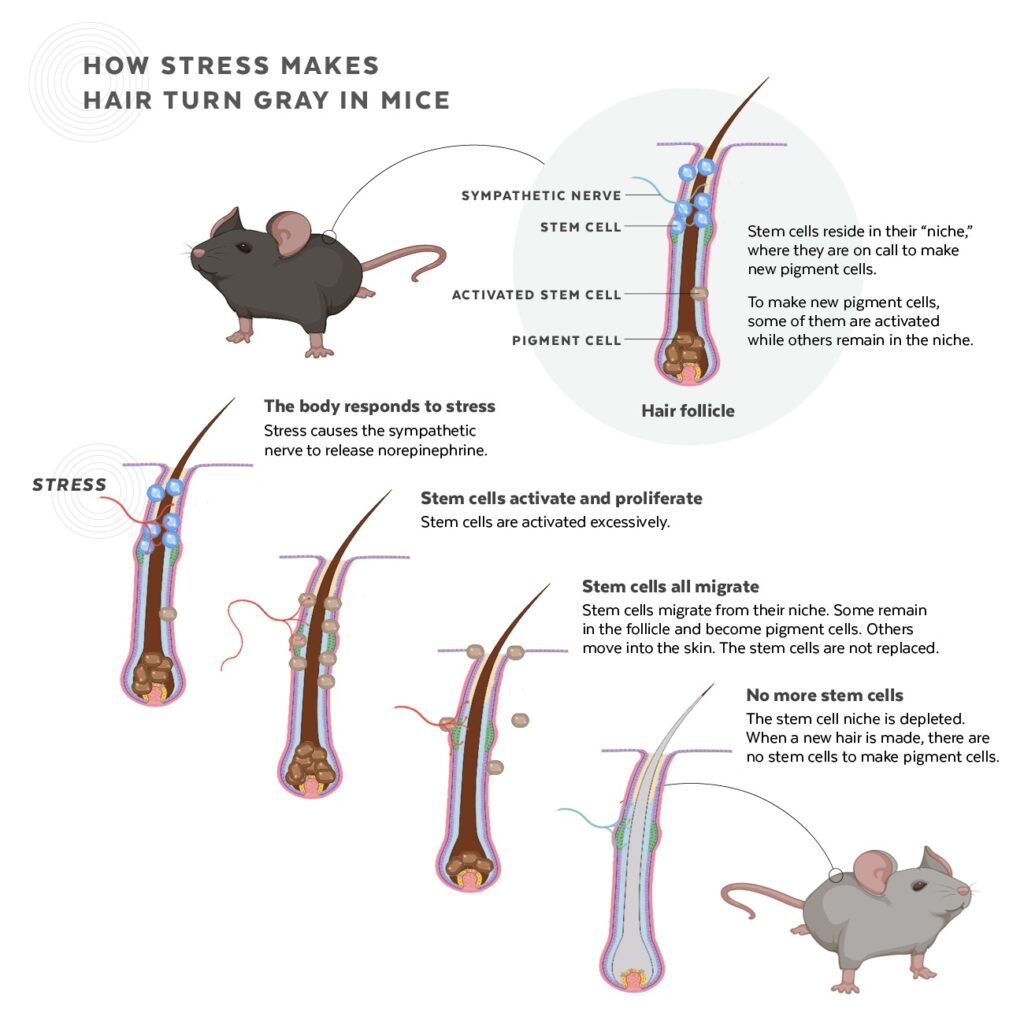Is your job, kids, or spouse causing your hair to turn gray? Maybe, there’s some truth to it.
Share

Gray hair has long been associated with aging, but recent research suggests that stress may also play a role in causing premature graying. It’s a well-known fact that stress can impact our overall health, but can it really affect the color of our hair? Let’s take a closer look at the connection between stress and graying hair, how to tell if stress is the culprit, and what you can do about it.
To understand how stress can impact hair color, it’s essential to understand the science behind it. The color of hair is determined by melanocytes, pigment-producing cells found in hair follicles that produce melanin. As we age, the number of melanocytes decreases, leading to gray or white hair.
The link between stress and graying hair stress has long been known to have a wide range of effects on the body, including changes in the skin, nails, and hair. While the exact mechanisms are not fully understood, research suggests that stress may impact the melanocytes in our hair follicles, leading to premature graying.
A study conducted by researchers at the Harvard University found that stress triggers the release of stress hormones, such as cortisol, which can impact the melanocytes. Cortisol, when produced in excess due to chronic stress, can disrupt the normal functioning of melanocytes, leading to a decrease in melanin production and, ultimately, premature graying of the hair. Another study published in the journal Nature further supported this theory, demonstrating that stress can cause the depletion of melanocyte stem cells, which are responsible for producing new melanocytes.

Judy Blomquist/Harvard University
How to tell if stress is turning your hair gray determining if stress is the cause of your premature graying hair can be challenging, as other factors, such as genetics, play a significant role in hair color. However, if you have experienced a significant amount of stress in your life and notice that your hair is turning gray at a young age, stress could be a contributing factor. It’s essential to keep in mind that premature graying can also be a result of other medical conditions, so it’s best to consult with a healthcare professional for an accurate diagnosis.
What to do about it if you suspect that stress is causing your hair to turn gray prematurely, there are steps you can take to manage stress and potentially slow down the graying process:
- Practice Stress Management Techniques: Incorporate stress management techniques into your daily routine, such as exercise, meditation, deep breathing, or yoga. These techniques can help reduce the production of stress hormones and promote relaxation, which may benefit your overall health, including your hair.
- Prioritize Self-Care: Taking care of yourself is crucial in managing stress. Get enough sleep, eat a healthy diet, and make time for activities that you enjoy. Engaging in self-care can help reduce stress and promote overall well-being.
- Seek Support: If you’re feeling overwhelmed by stress, don’t hesitate to seek support from friends, family, or a therapist. Talking about your stressors and emotions can help you manage stress better and reduce its impact on your physical health, including your hair.
- Avoid Harsh Hair Treatments: Harsh hair treatments, such as frequent coloring, perming, or straightening, can damage your hair and potentially exacerbate premature graying. Avoid using harsh chemicals and heat on your hair, and opt for natural and gentle hair care products.
By taking these steps, you can not only manage stress and promote overall well-being but also potentially delay the onset of premature graying.
References:
- Arck PC, Overall R, Spatz K, et al. Towards a “free radical theory of graying”: melanocyte apoptosis in the aging human hair follicle is an indicator of oxidative stress induced tissue damage. FASEB J. 2006;20(9):1567-1569. [Link]
- Zhang B, Ma S, Rachmin I, et al. Hyperactivation of sympathetic nerves drives depletion of melanocyte stem cells. Nature. 2020;577(7791):676-681. [Link]
- Ganceviciene R, Liakou AI, Theodoridis A, Makrantonaki E, Zouboulis CC. Skin anti-aging strategies. Dermatoendocrinol. 2012;4(3):308-319. doi: 10.4161/derm.22804. [Link]
- Harvard Gazette article [Link]
If you enjoyed our content, please share, comment, like, and follow us on your favorite platforms!
.

